Morocco 2009
MORROCO - told like it is
Although it is not like me to have a crazy idea, I had one. I decided to fly to Marrakech in Morocco, hire a car and drive down to the Sahara desert. Some friends had been on guided motorcycle adventure tours in Morocco and raved about the place. How following someone who knows the way, with a 4x4 behind to pick up the pieces and staying in pre-booked quality hotels can be an adventure I am not sure, but that is another matter.
The itinerary was not difficult. The trip was to take nine days overall, and there are only two routes to the proper Saharan dunes from Marrakech. After talking to one of the above friends and spending many hours studying guide books and the internet it appeared to be possible to cover both routes in the time, although that would mean driving about 1000 miles.
The flight, car and hotel for the first two nights were booked on the internet. Originally I had planned to book more hotels in advance, but after my friends' experience of being held up for a day in Marrakech due to snow on the pass to the south I decided to just book the first two nights and deal with the rest as I went along. The flight and hotel were booked through easyJet and the car with Europcar.
Fri 27.2
The flight was 15.40 from Gatwick, and arrived in Marrakech early at 19.00. There is no time difference between Britain and Morocco. After ceremonial stamping of my passport and rescanning of all my luggage I changed €400 into Dirhams and emerged into Africa.
I decided that it would be pushing my luck, even with experience of driving in 22 countries, to collect a car at the airport and drive in the dark to my hotel in Marrakech, and in any case I did not need the car until Sunday. This meant getting a taxi. Moroccan taxis come in two sorts, petite and grand. A petite taxi is something like a Fiat Uno, whereas a grand taxi would be a Mercedes or people carrier, generally intended for more people or longer distances. Marrakech taxi drivers refuse to use meters (some don't even have them) and the price for the journey is supposed to be agreed at the point of pick up. According to all reports, a fair price for the 6km from the airport to city centre was 50 - 60Dh.
The only taxis in sight were 1980's Mercedes, and one driver came forward and took me to his cab. I showed the hotel address and asked how much. He said "200". I said "too much". He said "night". There seemed to be little point in asking another driver, because they would all be in league, so it was that or walk. 200Dh is £16.50, more than it would be in Bognor with a better car and better driver. There had just been a heavy downpour, and we splashed our way to the hotel through water across the road most of the way with mopeds overtaking on both sides. I paid the driver with no tip, and he went off to his large detached house in the suburbs and took the next day off to play golf.
The Corail Hotel was rather more imposing than I had expected, with columns in front and a porter with a red outfit topped with a fez, the only one I saw in Morocco. The Corail was one of the cheapest hotels on the easyJet list, but it has always been my philosophy that if there are no bugs on the wall I am paying too much. There was only one review on TripAdvisor, and that was not very good. I had a nice room, overlooking the yard behind the AUDI/VW dealership, with flats and palm trees in the background. The restaurant was a gloomy, wood-panelled room, with an equally gloomy waiter, and I was the only guest. As I had booked half-board I had the fixed meal - couscous, which I was dreading, because I can't stand semolina. I picked the meat and vegetables out, leaving the semolina. At least it was dry, not like the slimy stuff we had at school.
Sat 28.2
There were a few more people at breakfast time, and I sat by what looked vaguely like a swimming pool adjacent to the gloomy restaurant. By searching through the trays it was possible to find some spotlessly clean cutlery, and the buffet breakfast was ok.
At 9.30 I set off into Marrakech. My hotel was in Guilez, the "new" quarter built by the French in the 1920s and 30s, and it was a half-hour walk to the Medina, the old walled town. The traffic was manic. There were cars, buses, lorries, horses and carts, donkey carts, hand carts, things like tuk-tuks and a fantastic number of mopeds and small motorcycles, which are the staple transport for a large proportion of the population. The 2-wheeled vehicles drive at speed on the pavement and pedestrian areas as well as the road.
Crossing the road is almost impossible. At times I tried to take refuge on the 6inch wide black strip between the yellow lines in the middle of the road, and eventually I found that the best way was to wait until I found a woman with 2 children trying to cross and walk over level with them. The most amazing thing I saw was a pedestrian crossing in front of the railway station. There were traffic lights to stop the cars coming from the right, and when the cars stopped the green man came on. However, there were no lights for the traffic coming from the left, and that just continued to flow past at speed while the green man was on.
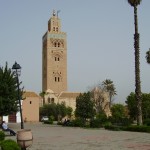 I took some photos of the Koutouba mosque, which is the most important one in Marrakech, but non-muslims are not allowed inside. Then on to Place Djemaa El Fna, which is the main square in the Medina, and the scene of all the action. Snake charmers, dancers, story-tellers, play-actors, shoe cleaners, fortune-tellers, food stalls, accompanied by marvellous sounds, and I regretted not bringing my camcorder. It is difficult to take photographs of people or small groups, because if they see you they expect to be paid, and you can't pay everybody. The only disappointing
I took some photos of the Koutouba mosque, which is the most important one in Marrakech, but non-muslims are not allowed inside. Then on to Place Djemaa El Fna, which is the main square in the Medina, and the scene of all the action. Snake charmers, dancers, story-tellers, play-actors, shoe cleaners, fortune-tellers, food stalls, accompanied by marvellous sounds, and I regretted not bringing my camcorder. It is difficult to take photographs of people or small groups, because if they see you they expect to be paid, and you can't pay everybody. The only disappointing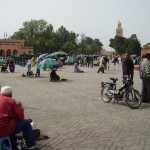 thing was that I could not find the man who pulled teeth, because he would probably have been cheaper than my Swedish dentist, and the outcome would be the same.
thing was that I could not find the man who pulled teeth, because he would probably have been cheaper than my Swedish dentist, and the outcome would be the same.
Adjoining the square were endless souks (markets), with alleyways and passages stretching for miles. Apart from food, the stalls were offering mainly either traditional products (carpets, fabrics, jewellery, etc) or the same range of Chinese stuff that you can buy here (electronics, watches etc) Most of the watches carried names like Breitling, Rolex and D&G. I would have advised the West Sussex Trading Standards Officer, but I don't think he goes that far. The only thing I was really looking for was a belt, because the jeans I wore for the journey were tight enough not to need one, and I had forgotten to bring one. My other trousers needed one. On the way to the Royal Palace I came across a man walking 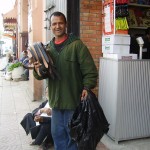 around with a bundle of leather belts. I glanced at them and he said "ten", by which I thought he meant 10Dh. It turned out that he meant €10. I said "No, no, no!" and walked on, with him chasing me, shouting a succession of ever decreasing prices. Eventually he got down to €3.50, which was still probably more than I could have got one for at Ford Market, but we settled for that. I should have asked him for the whereabouts of the man who pulled teeth, because he was obviously a regular client. By this time my knee was giving up so I had ½ chicken and chips in a café and went back to the hotel and read for 2 hours.
around with a bundle of leather belts. I glanced at them and he said "ten", by which I thought he meant 10Dh. It turned out that he meant €10. I said "No, no, no!" and walked on, with him chasing me, shouting a succession of ever decreasing prices. Eventually he got down to €3.50, which was still probably more than I could have got one for at Ford Market, but we settled for that. I should have asked him for the whereabouts of the man who pulled teeth, because he was obviously a regular client. By this time my knee was giving up so I had ½ chicken and chips in a café and went back to the hotel and read for 2 hours.
Later in the afternoon I came back to the square with my camcorder, and wandered around holding it surreptitiously, mainly to capture the sound. There was more action now, and at one point 2 dancers in traditional costume performed for me for about 15 seconds and demanded payment. I gave one of them a coin which I thought was worth about £1 but it turned out that it was worth about 10p and they were not pleased. I then found a 10Dh piece, which 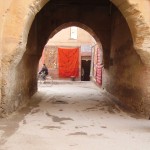 one of them grabbed and demanded the same for his mate. I did not have another, so they demanded paper money. Eventually I found some more coins adding up to about 70p I think, and they went off disgruntled. At dusk the Koutouba mosque sounded the call to prayer, which was very atmospheric in that environment.
one of them grabbed and demanded the same for his mate. I did not have another, so they demanded paper money. Eventually I found some more coins adding up to about 70p I think, and they went off disgruntled. At dusk the Koutouba mosque sounded the call to prayer, which was very atmospheric in that environment.
At 7.00 I left the crowded square and went back to the hotel for the evening meal, which was a sort of cutlet and not at all bad. The only other guests in the dining room were three German businessmen discussing, not surprisingly, the state of the euro and whether Germany should bail out the rest of the eurozone.
Afterwards I went down the road to the Ibis Hotel next to the very imposing new railway station and booked a room at the Ibis Hotel in Ouazazate for the next night.
Sun 1.3
After breakfast I walked up to the Europcar base in the Boulevard Zerktoni about ¼ mile away. There were 2 cars outside, one of which was a silver Citroen C3 which did not look too bad from a distance. The man in the office spoke good English, and as soon as I went in he said "Ah, you must be Mr.Billingham", which was a good start. He sorted out the papers and told me I was getting an upgrade. We went out to the Citroen, and at close quarters it turned out that there were small dents in all four wings, one door, one windscreen pillar and the rear bumper. There was a hole in the front bumper and part of the badge was missing from the grille. I tried to get him to note down all these defects, but eventually he said "If I write down all the things that are wrong with this car it will look as if I am giving you a bad car". He just wrote "small pumps in all wings and all round, badge broken", which I felt left me some latitude to make some additions if the occasion arose. The car had done 95,000 km, and bearing in mind that 1 km in Morocco is equivalent in wear and tear to 5km in England, it was pretty well used. On the way back to the hotel I was really thrilled about my upgrade.
Once you are part of it the traffic is not as daunting as it appears to an onlooker, and the main road out of Marrakech to the south was quite easy to find. My target for the evening was a French garrison town called Ouazazate (pronounced Warzazartay) in the desert the other side of the Atlas mountains. There is only one main road (N9) leading south, over the Tizi-n-Tichka pass (2200m), which can be closed by snow any time until the end of April.
On the way to the pass there is a small town called Zirkten, which the Rough Guide says has a Sunday souk (market), but it did not mention that the market is held in the middle of the main road.
In Zirkten I suddenly found the road blocked with a solid mass of people. There were large vehicles parked both sides, piled up with goods of all sorts and the only way appeared to be through the middle. I started gently pushing my way into the crowd, slipping the clutch (the C3 is ridiculously high geared) and hoping it would not burn out before the end of the market. Then the inevitable happened, and some people moved aside, leaving me face to face about 6ft from another car struggling through from the opposite direction. Anyway, we managed to squeeze past one another and the 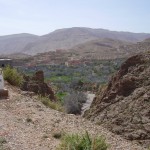 car emerged from the crowd with the clutch intact. There was almost no traffic on the road, and the scenery over the pass was superb.
car emerged from the crowd with the clutch intact. There was almost no traffic on the road, and the scenery over the pass was superb.
The Rough Guide made a big issue of a place called Kasbah Telouet, on a minor road about 21km from the main road, some distance after the pass. It is said to be one of the best ruined kasbahs in Morocco, built by a wealthy family. The turn-off was well-signposted, on to a narrow, winding road. After a few miles a car containing three young men in Arab dress came flying round a bend, half on my side of the road, causing me to stop. They came very close alongside, wound down their windows, hammered on my windows and yelled loudly at me. I did not make any effort to find out what they were saying, but just stuck the car in gear and raced off. Fortunately, at that moment a white 4x4 appeared behind me and that took their attention.
When I got to Telouet the kasbah was some distance off the road on the right hand side, and there was another young Lawrence of Arabia standing by an area of land with a parking sign on it. He spoke good English, and explained that you had to park here and walk 200m to the kasbah. His name was Mohammed, he was my friend, and he would take me to the kasbah. I could not see what else to do, so I parked, and we walked to the kasbah, about 500m along rough tracks. When we got there Mohammed said he would find the guard to open the door, which was locked. After a couple of minutes he appeared with a scraggy-looking character, holding a key like the one to the Tower of London. Mohammed took me round the kasbah, which had vast areas of mosaic on the floors, walls and ceilings, and was in a fair state of decay. When we came out, Mohammed said "you will have to give the guard 20Dh" (about £1.70), which I did. On the way back to the village Mohammed explained that he worked for a foundation that was associated with UNESCO and raised money to help maintain the kasbah and also for needy women. Their headquarters were in the village. Along the line he also referred to it as his head office. As we approached the car Mohammed said "Come with me to our office, I will give you their card".
You've guessed by now. The headquarters of the "foundation" was a carpet and gift shop, and I though the stuff was overpriced and refused to buy anything. Mohammed looked very embarrassed about the situation. and followed me back to the car, where I gave him a good tip for taking me round the kasbah and departed.
After I rejoined the main road the scenery changed, and the mountains were like giant slagheaps. It was very much like some of the less attractive parts of the American deserts, and this continued to Ouarzazate. The town is a French Foreign Legion garrison, built in the 1920s, and has an atmosphere strangely similar to Barstow, a famous town in the Californian desert. Neil at work had warned me about getting forcibly enlisted into the Legion (I think he was hoping), but that did not happen. There were plenty of legionnaires around, dressed in fatigues like American soldiers rather than the fancy outfits you see in films. They didn't look all that hard to me, but I didn't care to do anything to find out.
After a struggle I found the Ibis Hotel and walked back to the main street for a meal and a look round. On the way back I got some toilet paper amongst other things, because many garage or restaurant toilets don't have any.
Mon 2.3
Today's itinerary was to reach a town called Tineghir (one of several different spellings) passing through the Skoura valley and visiting the Dades and Todra Gorges, which are on side roads into the mountains. The Skoura valley is noted for its oases, with palm trees a short distance from the road. There are many kasbahs along this route, some ruined, some intact, as there are throughout southern Morocco. Before the Dades Gorge the road passes through El Kelâa des Mgouna, which is a town apparently dedicated to the production of rose water in myriad forms. There are stalls and shops at the roadside with vast quantities of bottles of the stuff, and I stopped and bought a bottle as a present for someone, without having the slightest idea what it really is or how you are supposed to use it. And the bloke in the shop didn't hassle me unduly.
The road to the Dades Gorge turns off at Boumalne du Dadès, and for cars is a 25-mile long cul-de-sac climbing up into 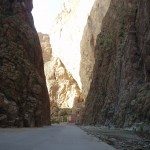 the mountains past palm groves and culminating in a spectacular road with many hairpin bends. On the way back I managed to make a video, made more exciting when the camera fell over on the dashboard, giving the impression that the car tipped over on to its side. After the gorge I went into Tineghir to find a hotel. The Rough Guide had a map showing several hotels in the back streets, so I turned off opposite to the Total petrol station, which was on the map, and instantly entered the third world. Rutted unmade roads, partly muddy, vehicles and people all over the place. The hotels appeared to be in narrow streets that you could hardly get a car down, and this was obviously backpacker country. I made my way through the mess in the town square along a slightly wider street lined with workshops and people doing things at the side of the "road". To my surprise I came upon one of the hotels listed in the RG, a place called the Tomboktu. The guide said it had gone downhill, but remained one of the memorable small hotels of Morocco. Gone downhill? It looked rough even by my standards. There was no parking as far as I could see, and if I had left the car in the street round there, all that would have remained in the morning would have been the hole in the front bumper. Eventually I managed to find a decent hotel on the hill above the town.
the mountains past palm groves and culminating in a spectacular road with many hairpin bends. On the way back I managed to make a video, made more exciting when the camera fell over on the dashboard, giving the impression that the car tipped over on to its side. After the gorge I went into Tineghir to find a hotel. The Rough Guide had a map showing several hotels in the back streets, so I turned off opposite to the Total petrol station, which was on the map, and instantly entered the third world. Rutted unmade roads, partly muddy, vehicles and people all over the place. The hotels appeared to be in narrow streets that you could hardly get a car down, and this was obviously backpacker country. I made my way through the mess in the town square along a slightly wider street lined with workshops and people doing things at the side of the "road". To my surprise I came upon one of the hotels listed in the RG, a place called the Tomboktu. The guide said it had gone downhill, but remained one of the memorable small hotels of Morocco. Gone downhill? It looked rough even by my standards. There was no parking as far as I could see, and if I had left the car in the street round there, all that would have remained in the morning would have been the hole in the front bumper. Eventually I managed to find a decent hotel on the hill above the town.
To complete the day I drove out to the Todra Gorge, which was a much shorter distance off the main road than the Dades, and had entirely different character. It started with beautiful dense palm groves, and then became a high sided gorge rather like Cheddar but with a river alongside the road, flowing over it in some places.
I took the car back to the hotel and then walked down to the third world below. There was a souk in progress, with the usual dark narrow alleys and archways, just the sort of place the Foreign Office website tells you to be careful of. Needless to say, I quickly encountered a "friend" who knew someone in Plymouth and he insisted on taking me up some stairs to see a lady who did weaving. She had some skeins of stuff hanging up which looked amazingly unattractive, so I declined to make an offer. She did not seem surprised. I was probably the 10,000th foreign visitor who left without buying anything.
Having survived the dark alleys of the souk I went to look at the road with all the workshops. It was a real hive of industry, with people doing all sorts of metal and woodwork. Making furniture, windows, wrought iron, sheet metal items, and in amongst them was a motorcycle business, the entire stock of which even I would have thrown away. Everybody stared at me, but I did not feel particularly threatened.
Tue 3.3
This was to be the last stage of my journey to the Sahara. All the way from Marrakech I had encountered people at the roadside trying to sell things to passing tourists, of which there were actually very few. During the past two days I had seen the same three vehicles over and over again, two French camper vans and a couple in a Hyundai Atoz. There were a fair number of groups of 5 or 6 white 4x4s and minibuses taking people for "adventure tours" in the desert, but the roadside sellers know they are not going to get anywhere with those people. After Tineghir it got beyond a joke. I appreciate that the people are having a hard time with so few tourists, but I could not be a meal ticket for every poor person in south east Morocco. Several times I was forced to a standstill by a man standing in the road. All I could do was stop and wait under he came round the side and then accelerate away with him hanging on to the door handle or mirror, yelling at the top of his voice. The images of their contorted, angry faces level with the waistline of the car will be with me for ever.
The scenery on this stretch was, in general, rather boring, relieved by occasional items of interest such as camels, strange black long-haired goats, and the only road accident I saw in Morocco. A car upside down about 30 yards from the road, with a policeman standing by it. About 11 o'clock things took a turn for the worse, when I got an unpleasant feeling in my stomach. Not here, no, not here, I thought. I had a good stock of tablets for dealing with this subject, but they take time to act. Originally I was intending to go to the dunes at Merzouga, my ultimate target, and then come back to a town called Rissani and stay the night there. As it was I decided to book in at Rissani before going on to Merzouga, to sort myself out. In Rissani I quickly found a very Moroccan old hotel called the Sijilmassa recommended by the RG and booked in. The two men running the hotel were ok, but in the entrance there was the usual "friend" in Arab gear who introduced himself with "Welcome, my name is Youssef. There is a market in town today, I will show you round". The first thing I had to do was to rush upstairs to my en-suite toilet. The room was very old-fashioned, but quite comfortable and there seemed to be no other guests in the hotel. When I came down Youssef was waiting for me, and I pointed out that I had come all the way from England to go to Merzouga, and to Merzouga I was going to go, regardless of his market. He said he would wait until I came back and then take me round the market.
Merzouga was only about 20 miles, and the famous Erg Chebbi Saharan dunes are at the end of the road, just past the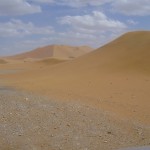 village. There was no one there apart from three "friends". One was standing in the middle of the village, one was on a moped in the village, and the other was at the dunes. The one on the moped chased me down to the dunes. There is a large area of tarmac with some sand on it, leading to the base of the first dune. I drove across it, and guess what -- I GOT STUCK IN THE SAND! The Rough Guide says "should this happen, rest assured that help will never be far away, but expect to pay dearly for a 4x4 rescue".
village. There was no one there apart from three "friends". One was standing in the middle of the village, one was on a moped in the village, and the other was at the dunes. The one on the moped chased me down to the dunes. There is a large area of tarmac with some sand on it, leading to the base of the first dune. I drove across it, and guess what -- I GOT STUCK IN THE SAND! The Rough Guide says "should this happen, rest assured that help will never be far away, but expect to pay dearly for a 4x4 rescue".
To my immense relief, when I put the car in reverse it came out under its own steam, or, rather, before reaching the point of making any. I took some photographs, fought off my friends and went back to Rissani. Somehow I got lost in the middle of the town, and finished up in a square which was a cul-de-sac apart from a narrow alley straight ahead similar to the ones James Bond would go through on two wheels with the car tipped to 45º. I started to turn round and was approached by someone who welcomed me and asked me where I wanted to go. I told him the Hotel Sijilmassa. He said "That is my family's hotel. I am from there. I will take you, follow me. We go through there" He pointed at the alley. I said it was too narrow, but he insisted on walking in front of me and somehow I got through without resorting to two wheels or adding to the dents in the wings. At the end he wanted to show me the market, but I managed to escape. At the Sijilmassa Youssef was waiting for me, of course, and insisted on taking me to look at the kasbah and market. It was no good refusing, because he would have followed me anyway. I was the only possible source of income in town, and he was not going to let me go.
He took me round the ruined kasbah and then we went into the market, which was actually quite interesting, with a lot of food and animals, as well as the usual stuff. The RG says it is famous and people set off early in the morning to get there. Inevitably we eventually worked our way through a maze of passages and came into a gift shop, which Youssef said belonged to his family. I was not happy about the situation, and I said "Look, I am not staying here" and walked out, with him trotting behind me. Somehow I found the way to the road and we walked back to the hotel in silence. As we sat on the hotel veranda having a drink I suddenly asked him "Why is it that every friend (emphasising the word) that I have met in Morocco finished up taking me into a shop and trying to sell me something?" He went quiet for a moment, and said "It is the culture". I gave him what I thought was a good tip for taking me round.
For the evening meal at the hotel I had ordered tagine, which I don't really like much anyway. I got half way through and rushed upstairs to my bathroom just in time to bring all of it up. By now the problem at the other end had fully developed, and I was in for a bad night. I took a dose of anti-diarrhoea tablets, but I must have visited the toilet 15 times, and in the middle of the night I was desperately thirsty. There was no way I could risk drinking the tap water, but I had a bottle of water in the car. I crept downstairs with a torch, but as soon as I saw the lock on the hotel door I realised that it would take hours to get through that with a nail file. Luckily there was a drinks cabinet in the bar, so I helped myself to a bottle of water and paid for it in the morning.
Wed 4.3
During the night I had no sleep, and could not face the thought of breakfast. By now I had abandoned the idea of going to the other dunes at M'hamid, and decided to go straight back to Marrakech, which was about 350 miles. The first 200 miles were more or less a straight bash across the desert, with no towns of any size, on a route to the south of the 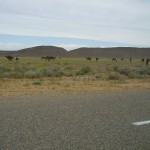 one I had driven on to Rissani. As soon as I had got up I took a dose of Instant Action Diarrhoea capsules, in the hope that they would keep things under control for the journey.
one I had driven on to Rissani. As soon as I had got up I took a dose of Instant Action Diarrhoea capsules, in the hope that they would keep things under control for the journey.
The guide books all say petrol supplies in Morocco are unreliable, and that certainly appeared to be case. The first filling station after Rissani had no unleaded, and the next, which was quite large and modern, had no fuel at all. No unleaded was available until Asnif, which is about 60 miles. This was no problem for me, because I had kept the tank at least half full, but it shows that you could run into trouble.
By about 12.30 I had reached a small town called Nekob and felt too shattered to go on. The RG had 2 or 3 recommended hotels, one of which was called Auberge-Kasbah Enakhil .. It was easy to find, on the main road, and was a very Moroccan establishment, like a little fort. The accommodation was in a 2-storey building, the auberge being downstairs and the kasbah above, although I was not very clear about the difference. The man in charge seemed to think I should go in the auberge, which was 100Dh (about £9) for the room, plus 25Dh for breakfast. Perhaps he thought I looked too poor to go in the kasbah, or too ill to climb the stairs.
In the auberge the rooms were alongside a wide corridor permanently open at both ends. My room had 2 beds with a beautiful view across the desert, and the toilets and showers were at one end of the corridor. The first thing I did was to flop down on the bed and try to sleep for a couple of hours. When I arrived I had ordered tagine for the evening meal, but at about 4 o'clock I decided that I could not face that, so I cancelled it and went into town to see if I could get some fruit and anything else that I might be able to keep down.
The main street of Nekob was straight out of the third world again. It was lined with people doing things at the side of the road, and there were food stalls and hole-in-the-wall shops. Several stalls had fruit, all just the same, with bunches 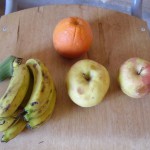 of slightly withered tiny bananas, shrivelled oranges and bruised apples. All covered with dust. I doubt whether Nekob gets many visits from the food buyers for Marks & Spencer or Waitrose.
of slightly withered tiny bananas, shrivelled oranges and bruised apples. All covered with dust. I doubt whether Nekob gets many visits from the food buyers for Marks & Spencer or Waitrose.
I bought one bunch of tiny bananas, one of the less shrivelled oranges, and two bruised apples. Then a packet of biscuits from a hole-in-the-wall shop heavily stocked with comfort foods. You would need something if you lived in Nekob, and I would imagine that there would be plenty of work for the tooth puller from Marrakech.
Back to the hotel, and all I could eat was one small banana, which was better than it looked. Back to bed. Every couple of hours in the night I had to stumble along the dark corridor with a tiny torch to the toilets, and again I had no sleep. Eventually the torch packed up, but by then I could find the way in the dark. Fortunately the only other guests in the hotel were four young Germans who were in the kasbah upstairs, and I saw nothing of them.
Thurs. 5.3
I tried breakfast, but all I could get down was half a biscuit and a cup of coffee. The car was in a courtyard, surrounded by a wall with an entrance with massive steel gates like the ones on a Foreign Legion barracks. When I went to put some things in the car the Germans were just departing (in a car like mine, but so far with fewer dents) and the steel gates were firmly closed behind them to make sure that I did not get away without paying my £11.25.
In theory Marrakech was a not too difficult day's drive, and I decided to see how I felt about going the whole way when I got to Ouazazate. In the event I got to Ouazazate at about 12.30 and did not feel like driving any further. There were some wonderful proper Moroccan hotels on the outskirts of the town, but I played safe and went back to the characterless Ibis and lay on the bed for a couple of hours. In the middle of the afternoon I walked down into the town and had a look round. It was nothing like Tineghir, more like Harlow, and after a cup of coffee I went back to the Ibis.
By the evening I had had almost nothing to eat for 3 days, not enough to drink and no sleep for 2 nights. When I was 11 I wanted to be a doctor, and it was at times like this that I wished I had become one. At least I would have known what was likely to happen next. Would I start hallucinating, or fall over? Hallucinating on the Tizi n' Tichka pass, with its hairpin bends and sheer drops did not seem a very good idea.
Fri. 6.3
To my surprise I slept well and woke up feeling fine, and hungry. Breakfast went down well, and I was quite happy about facing the rest of the trip to Marrakech. The car did not have to be back until 18.00, so there was plenty of time.
In many places during the trip I had seen men at the roadside holding up large stones containing coloured crystals, which are quite expensive at home. There were a number of such stone-sellers on the way to the Tizi n'Tichka pass and in moment of folly, probably a result of my recent illness, I decided to stop by one and find out how much they were. This was a mistake. The man came round to the open window and thrust his arms in and dumped the two halves of a big stone in my lap. I would estimate his age to be about 105 and at first sight he appeared to be wearing a wrinkled brown leather mask. His arms were like solid rods of steel, which I suppose they would be if he had spent years waving them about holding heavy stones. There was a lot of shouting about the price, partly in German, because he appeared to think I was of that nationality, and I came away with 2 big stones for about £11. I didn't really want them, but that applies to most of the other things in my house, and they will fit in nicely.
The scenery going north over the pass with the sun behind was absolutely fabulous, equal to anything I have ever seen. There were quite a lot of large trucks going the other way, but none going in my direction, which was fortunate, 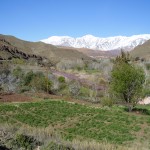 because they can be very slow and difficult to pass. Zirkten appeared quite different without the souk, and there was another small town where everybody was repairing vehicles on the road verges from one end to the other.
because they can be very slow and difficult to pass. Zirkten appeared quite different without the souk, and there was another small town where everybody was repairing vehicles on the road verges from one end to the other.
The traffic in Marrakech had not calmed down since I left on Sunday, but I survived through to the Corail Hotel. The walk-in price was almost exactly double what I had paid for the booking made through easyJet, but the hotel was near the station, which made it convenient for getting a taxi to the airport in the morning. The room was nicer than before, with a balcony and a view of the Theatre Royal. After checking-in and leaving my luggage I took the car back to Europcar. The man in charge looked round it to ensure that it was still as bad as when I collected it, and duly signed the papers. The C3 had rattled along for 1369km (856 miles) over Moroccan roads without incident, so I could not really complain.
I decided to give the gloomy restaurant a miss, and got something not too Moroccan to eat in a place not far away.
Sat. 7.3
The flight was 11.45, so after breakfast I went along to the station and found a petite taxi. The price to the airport was a mere 100Dh, only twice what it should have been. The passport check to leave the country took as least as long as when I arrived, but after that everything went very smoothly, and I was home at 5.15 in the afternoon.
So, what about Morocco? Make up your own mind.